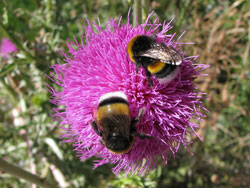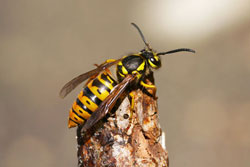Wasps and bees occasionally cause concern for homeowners. In general, they are part of both urban and rural ecosystems and should be managed only when they present difficulties.
Bees are beneficial pollinators and PlantTalk Colorado™ does not recommend killing bee colonies. Honeybees and bumblebees work blooming flowers and may cross paths  with people. Typically bees are not aggressive unless an unwary gardener grasps them.
with people. Typically bees are not aggressive unless an unwary gardener grasps them.
Yellow jackets are a yellow and black striped, ground-dwelling wasp that are very aggressive in the late summer and fall. They are scavengers and will eat caterpillars and many types of sugars and meats at picnics. Frequent rains can disrupt nest building of these ground dwelling wasps reducing their numbers.

The Polistes or European paper wasp also has yellow and black stripes and is often confused with yellow jackets. This wasp is a predator that builds paper nests in the eaves of buildings and in small cavities. Their habit of nesting around homes leads to stings on unwary people. However, the Polistes wasp is not a problem for outdoor dining because it hunts for live prey. This wasp will not be attracted to traps.
Hunting wasps, such as mud daubers, cause concern when they blunder into homes looking for prey. Several species occur in Colorado, but in general they are harmless to humans.
If bee hives are judged to be too close to a building entrance or children’s play area, many beekeeping companies or organizations will remove the colony to another, desirable location. For wasps living in undesirable locations, their nest can be destroyed with an insecticide such as permethrin or other pyrethrin. For more information, see fact sheet 5.525 Nuisance Wasps and Bees.



